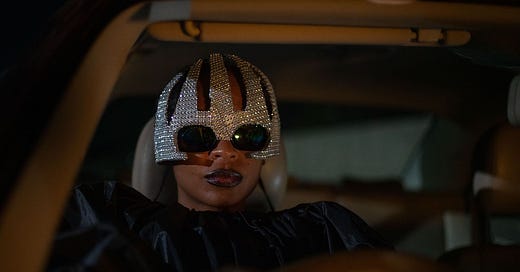Shula (Susan Chardy) is driving back from a costume party when she finds the body of her uncle Fred on the side of the road, the toes of his cowboy boots pointed directly at the sky. She climbs out of the car to face the body with a surreal calm, a demeanor that the rest of her relatives later use to accuse her of behavior “unbecoming” of someone who has discovered a dead body. “Why can’t you mourn?” they ask her. “You should wail like you’ve actually seen a corpse.” But Shula finds herself unwilling—or unable—to mourn.
Shula’s family is divided, though the most vocal part of it wants to uphold tradition and appearances, to put on a proper funeral for a patriarch gone before his time and under suspicious circumstances. Writer-director Rungano Nyoni draws increasing tension between what can be expressed, as is proper and socially acceptable, and what should be expressed but remains unspeakable. Uncle Fred is gone, and while some of his family members feel that a grand funeral with all the customs is necessary, others would rather his body be in the ground already. “He’s dead now, so it’s okay,” says one of Shula’s more ambivalent cousins.
Most of the tension comes from the feeling that something is wrong and no one wants to discuss it, which Nyoni communicates with the repeated use of dreamlike imagery of flooded rooms. In one sequence, Shula wakes up in the middle of the night to find her living room flooded in ankle-deep water, funeral guests sleeping in rows around the edges of the room with the water lapping her feet. Only Shula seems to be aware of the water flooding her home, threatening to drown the sleepers. On another night, her cousin’s university dorm is flooded; when the two visit a nighttime dance club to track down a relative, they find the dancers partying in deepening water, rain dripping across party lights inside. No one acknowledges the water. It simply exists, covering over a multitude of sins, an avenue for hidden rot.
The entire family seems to be rotting from the inside. All of Shula’s aunts have opinions about how she should properly mourn the death of her uncle—their brother—and nothing Shula can do will satisfy them. Nor does Shula seem particularly satisfied herself; Chardy plays her with a guarded look in her eye, gauging her relatives’ reactions to her. At one point, Shula and her cousins find themselves blockaded in the pantry by their aunts, one generation squaring off against the other like prey facing down predators. Shula’s head is surrounded by the weight of jars and containers, her aunts forming layers and layers of bodies between her and the door—the additional weight of familial history keeping her trapped with her back to the corner.
Nyoni draws her story to a close without catharsis, an increasingly tightening knot filled with the nightmare logic of a family tearing itself apart even as it attempts to present a whole and happy image to the rest of the world. Nyoni’s script and camera both are conscious of the hypocrisy that feeds the instinct to hide sin, pretending nothing is wrong. Silence covers over sin; it also enables it. Nyoni refuses to absolve her characters through silence; her imagery convicts and provokes, rather than smoothing the situation over. There are no easy answers: if you smooth over sin, you’ll end up mourning more than just one person in the end. —Sarah Welch-Larson
★★★★
On Becoming a Guinea Fowl is in limited release now.





